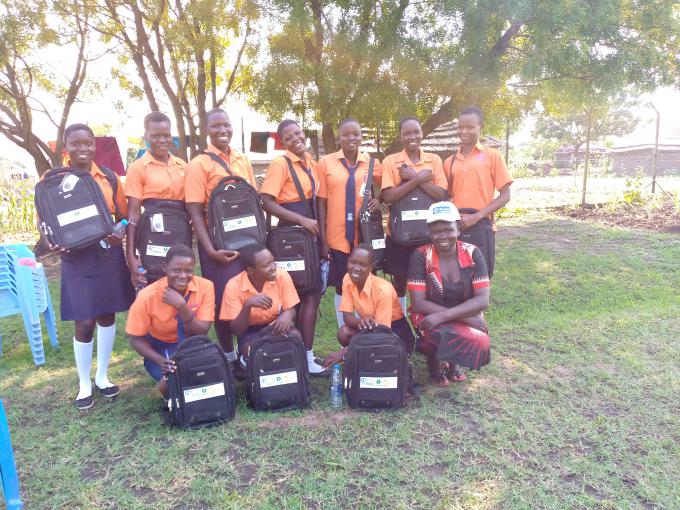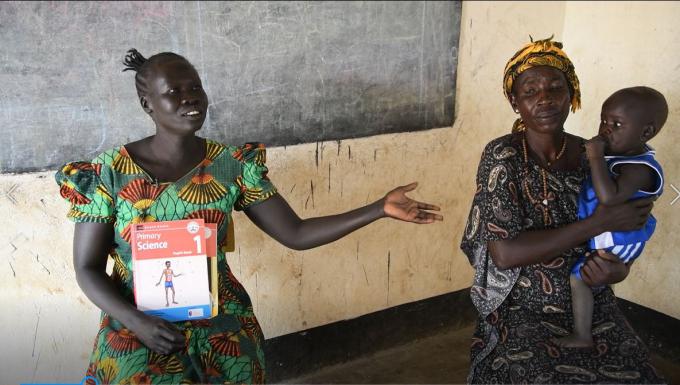Child caregivers encourage young mothers, female teachers to remain in class

Young mothers at Nimule Model School receiving learning kits. PHOTO: Plan International
Backstory: School-going young mothers and female teachers in Magwi County, Eastern Equatoria state say they have finally gotten the reprieve they need to concentrate on learning and teaching while in school.
This is after Plan International, a Multi-Year Resilience Programmme partner, implementing Education Cannot Wait project recruited caregivers to support the learners and their teachers in taking care of their babies.
The caregivers are given incentives every month and also trained on proper care for children. This is in line with MYRP/ECW efforts to enhance girls’ continuity of education through tracking and support to young mothers to enroll back in school/ learning centres and complete their education cycle.
In 2020, the number of out-of-school children in South Sudan was 2.8 million of which 53% were girls and 20-60% were children with disabilities. A draft finding of the Education Needs Assessment, among others, indicate that the least likely group of children to participate in education are; young mothers, married learners, child-headed households, learners with disabilities, children without a parent or guardian, and pastoralists children.
County officials, education leaders, and community members attributed the reasons for school dropouts particularly among girls to marriage, pregnancy, domestic duties, and lack of food and school fees. The finding also noted that there is an inadequate number of schools in the remote areas of South Sudan following years of conflicts. It said motherhood among young girls compromises their development opportunities, as dropping out of school hinders their formal education, resulting in employment and productive disadvantages, while making them vulnerable to poverty, violence, crime and social exclusion.
Even after returning to school – after giving birth – young mothers “do not concentrate on learning because of concerns over the welfare of their infants.”
20-year old Joska Achieng said:
“I used to run out of the classroom to breastfeed my baby especially when it is crying a lot. I depended on a relative to support me. But the crying became too much. My attention was divided during lessons.”
Teacher Adiyo Jackson, 40, who is a mother of five children has been teaching since 2006. She goes to school with her 10-month old baby boy.
During lessons, she leaves the child under a tree within the school compound, but the boy would cry and crawl to the classroom where she is teaching. This often-interrupted lessons as Adiyo " would often rush out in the middle of the lesson just to feed my baby."
Across South Sudan, female teachers are scarce because of the low transition rate for girls. A few make it to teacher training institutions hence posing a challenge in the enrolment of female teachers and support to girls as mentors. There is a general inadequacy of trained teachers across the country since the government lacks adequate financial capacity to support the National Teachers Training Institutes that would roll out the much needed In-service and Pre-service trainings.
Programme Activities: In order to address school dropout cases among young mothers, ECW/MYRP implementing partner, Plan International recruited, trained older women on how to babysit, illness detection among babies and general care and love for toddlers. Caregivers are also trained on Early Childhood Care.
MYRP/ECW support enables the school to hire older women as baby sitters to take care of babies while Adiyo and other female teachers are in the classroom conducting lessons.
The caregivers are now assisting young mothers and female teachers in four nursery schools and four ECD centres in Magwi. Their support has greatly changed teacher Adiyo’s work. She said she is now more relaxed and teaches with ease.
Adiyo Jackson Ochieng:
“These caregivers are mature people; they are mothers themselves and know how to take care of babies very well. They come early to school and help us concentrate on teaching our pupils.”
Adiyo Jackson Ochieng, a teacher of Primary 1 & 2 and her child’s care taker at Pebolo Nursery and Primary school in Magwi, Eastern Equatoria.
Aluku Sarah, Education Project Officer at Plan International said the caregivers, through the programme, are also given dignity kits.
“Most of the young mothers returned to school after caregivers took charge of their children. The young mothers haveeven improved in their studies. The teachers with babies used to not concentrate on their duties or teaching, but they are now encouraged and serious about imparting knowledge among the school children.”
Teacher Adiyo Jackson appealed for sanitary materials and incentives for female teachers and caregivers to improve their quality of living and teaching.
"The issue of irregular payment of salaries makes it impossible for us female teachers to buy our necessisities. We need additional support from the donor," she appealed.
In South Sudan, poor implementation or inadequate adolescent policies, weak laws prohibiting forced marriage, widespread illiteracy among adolescent girls, lack of job opportunities, poor skills and poverty, and lack of food are amongst the economic and political factors associated with the practice.
About ECW/MYRP
Education Cannot Wait is the first global multilateral fund dedicated to education in emergencies and protracted crises. Through the South Sudan Multi-Year Resilience Programme (MYRP), ECW project aims at ensuring that out-of-school children (OOSC) in priority areas have flexible, responsive routes into learning opportunities, that support their transition into further levels of education and that support their holistic wellbeing and development.
Save the Children International, Norwegian Refugee Council (NRC) and Finn Church Aid (FCA) as grantee agencies work together with 17 Implementing Partners across 6 States in South Sudan – under the leadership of the Ministry of General Education and Instruction.
Partners like Plan International focuses on increased access to learning opportunities, improved quality and continuity of education, enhanced school safety, mental health, psycho-social support, gender and inclusive education.
Story by Daniel Danis/Save the Children
Story Edited by Tito Justin/Save the Children
 South Sudan
South Sudan 